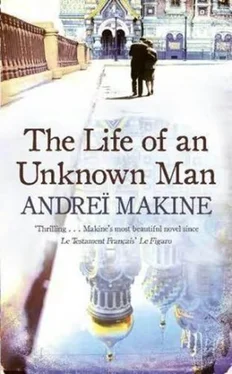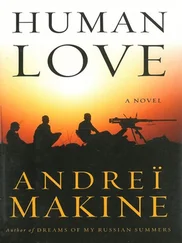Andreï Makine - The Life of an Unknown Man
Здесь есть возможность читать онлайн «Andreï Makine - The Life of an Unknown Man» весь текст электронной книги совершенно бесплатно (целиком полную версию без сокращений). В некоторых случаях можно слушать аудио, скачать через торрент в формате fb2 и присутствует краткое содержание. Жанр: Современная проза, на английском языке. Описание произведения, (предисловие) а так же отзывы посетителей доступны на портале библиотеки ЛибКат.
- Название:The Life of an Unknown Man
- Автор:
- Жанр:
- Год:неизвестен
- ISBN:нет данных
- Рейтинг книги:3 / 5. Голосов: 1
-
Избранное:Добавить в избранное
- Отзывы:
-
Ваша оценка:
- 60
- 1
- 2
- 3
- 4
- 5
The Life of an Unknown Man: краткое содержание, описание и аннотация
Предлагаем к чтению аннотацию, описание, краткое содержание или предисловие (зависит от того, что написал сам автор книги «The Life of an Unknown Man»). Если вы не нашли необходимую информацию о книге — напишите в комментариях, мы постараемся отыскать её.
The Life of an Unknown Man — читать онлайн бесплатно полную книгу (весь текст) целиком
Ниже представлен текст книги, разбитый по страницам. Система сохранения места последней прочитанной страницы, позволяет с удобством читать онлайн бесплатно книгу «The Life of an Unknown Man», без необходимости каждый раз заново искать на чём Вы остановились. Поставьте закладку, и сможете в любой момент перейти на страницу, на которой закончили чтение.
Интервал:
Закладка:
One day he had to go out early and downstairs on the lid of a trash can he noticed a large black leather bag. In the metro a doubt assailed him: that bundle had not been a bag. Passing again at noon he did not see it but guessed it had been Léa’s old jacket. A frayed lining, leather curves molded to the shape of her body… The intense sadness that overcame him surprised him. Now, at last, he felt capable of putting into words the fleeting images that were the only truth in his life: that old jacket, Léa’s arm flung out across the covers in her sleep… She came back in the evening clutching a parcel to her chest. Shutov’s latest manuscript. Returned by a publisher. They ate supper in silence, then very quickly he flew into a rage against the “pygmyism,” as he called it, of the current literary world. Léa must have taken pity on him because she murmured in a less brittle voice, yes, her old voice: “Don’t be silly, Ivan. You’re not a failure at all. You’re like a… Yes, an explosion still waiting to be heard.”
From that evening onward she became even more remote.
But amid this waning of their love affair, an impressive recovery occurred. Shutov was invited to appear on a television program! Bizarrely, for a novel he had published three years previously, which had enjoyed no success. The publicist resolved the mystery: “You talked about Afghanistan in it: and now, with everything that’s happening there…” It was the book in which a young soldier burst into tears at the sight of an old woman and her dog killed in an artillery bombardment.
In telling Léa about the invitation Shutov chose to feign indifference and even made one or two mocking remarks (“Just you wait. I’ll torpedo their ratings…”). But in reality he felt as if he were making his last throw. In this young woman’s eyes he could once again become the writer who initiated her knowledgeably into the secrets of the profession.
He bought a plain blue shirt, because “stripes cause strobing on the screen,” he explained. Léa went with him, made up as if she were taking part in the broadcast herself.
This was due to go out around midnight. “After the game shows, the football, and the rest. That’s their scale of values.” Shutov quickly resolved not to allow himself any rancor. On television one must smile, be a little simplistic, no nuances. “Break a leg,” whispered Léa, and, tense as he was, Shutov gave a start before remembering this strange custom. From that moment onward it all felt quite surreal to him.
Dreamlike, too, was the late-night scheduling, which made the participants seem like conspirators (or spirits) gathered, ironically, around a garishly lit table. But above all, this obligation to be a smiling idiot. Nobody demanded it, yet a mysterious force clamped these foolish grins onto their faces, made them ogle like prostitutes soliciting customers.
Perched on a high stool (“just like the ones in a pickup joint,” thought Shutov), he studied the “panel.” There was a young black francophone writer, with a grin like in the Uncle Ben advertisement. A Chinese man, with a sly air, his gaze shifty behind his thin glasses. And, for good measure, himself, Shutov, a Russian. Three living proofs of the globalization of French literature. Just across from Shutov the makeup girl was giving the finishing touches to the face of a… What could one call him? Journalist, writer, editor, member of several prize juries, a well-known mediacrat whom Shutov used to refer to as “one of the literary mafia,” and at whom he must now smile. On this man’s left they had just seated a psychologist who specialized in happiness, a state of mind rare in rich countries. The psychologist was talking to his neighbor, a young woman dressed like a Halloween witch. Finally a latecomer appeared, a woman in her fifties with graying hair and a handsome, faded face. Blinded by the lights, she wandered this way and that around the table until an assistant showed her to her seat, next to Shutov. He met her gaze, the intelligence of which was at odds with the smooth pink of her makeup. She was the only one not smiling.
The broadcast began. The African was on first and revealed himself to be a brilliant professional. Everything about his little performance was polished: his voice, his laughter, his lilting delivery: then a veritable comic interlude in which, quoting from his novel, he played the parts of both the rich lover and the cunning mistress, amid a whole host of relatives, storytellers, and tribal magicians. A born actor.
After such a display the Chinese writer, despite his obsequious facial expressions, appeared dull. This was because he could hardly speak French. And yet this was the language he purported to write in and in which he was published by one of the best houses in Paris… What Shutov heard sounded, yet again, like something from a surrealist play. “Yang is joined to yin… so yang with yin is making… And Confucius is saying… Red dragon mountain… Yin completes yang…” These last words were repeated so many times that the presenter himself became confused: “So your character, yin fact-excuse me-in fact…”
But Shutov’s performance was a real disaster. He began with a long, elegant sentence: the duty incumbent on a writer to bear witness, the quest for truth, the way the psychology of the characters can subvert the author’s own preconceptions. For example, a battle-hardened soldier, confronted by the bodies of an old woman and her dog, bursting into tears. The presenter scented danger in this monologue and, with a deft intervention, found a way to limit the damage: “So, according to your book, it seems as if the Russians have a lot to answer for…” This journalistic vagueness created an opening for a recovery. But Shutov was already getting out of his depth. His tirade was compressed like a concertina, in it the writer’s mission, the Taliban, Tolstoy rereading Stendhal to write the Battle of the Borodino, surface-to-air rockets, and the obscenity of aestheticism in a book about the war were all mixed up together… A gleam of compassion appeared in the presenter’s eyes. “So there we have it,” he summed up. “Can it ever be possible to write about war in a novel?” This coup de grâce saved Shutov. He froze, his cheeks burning with shame, and with only one thought in his head: “Léa was watching all that.”
The contributions of the others gradually distanced him from the appalled dummy he had turned into. “When a man caresses his sexual partner,” the psychologist of happiness was saying, “the nucleus of her dorso-median thalamus begins to…” The young witch novelist took up the tale, her eyes widening in a trance: “The other is always the bringer of evil… The evil we refuse to acknowledge in ourselves…” It was already past midnight and the dreamlike aura was rapidly intensifying. Shutov felt less ridiculous. The tension within him finally relaxed, giving way to a melancholy clarity.
He told himself that this mildly weird charade was being played out in a country that had given the world Promethean geniuses, whose words had once confronted exile, death, and, worse still, attacks by philistines. A prophetic daring, lives sacrificed on the altar of truth… In his youth that was how he had seen this great and ancient literature. Now, on the other side of the table there was this elegantly smiling Chinese writer, whose books had been rewritten by an obscure editor (a living author brought to life by a ghost). On his left was this young woman setting out to shock the viewers with her demonic appearance. Facing him, an African from a land covered in millions of corpses was spinning pornographic yarns, lubricious anecdotes laced with folklore of dubious authenticity…
Shutov did not grasp what it was that dispelled this feeling of absurdity. His neighbor, the woman with graying hair, had a faint voice, or, rather, she employed no vocal tricks. It seemed as if she had serenely come to terms with the rules of this stupid game: on television, speaking last at midnight, a woman with her looks has no chance. Pensively, her head bowed, she met no one’s eyes. It seemed to Shutov as if she were addressing him alone.
Читать дальшеИнтервал:
Закладка:
Похожие книги на «The Life of an Unknown Man»
Представляем Вашему вниманию похожие книги на «The Life of an Unknown Man» списком для выбора. Мы отобрали схожую по названию и смыслу литературу в надежде предоставить читателям больше вариантов отыскать новые, интересные, ещё непрочитанные произведения.
Обсуждение, отзывы о книге «The Life of an Unknown Man» и просто собственные мнения читателей. Оставьте ваши комментарии, напишите, что Вы думаете о произведении, его смысле или главных героях. Укажите что конкретно понравилось, а что нет, и почему Вы так считаете.









